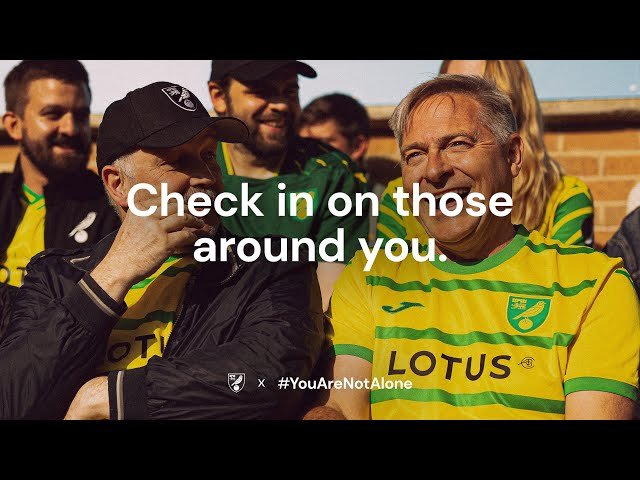Remember: “You are not alone”
Do you remember the famous UK Norwich City football team’s advert with the tagline “You Are Not Alone”?
This tagline was part of a 150-second TV ad launched 10 months ago for World Mental Health Day, and its impact has lasted much longer. The ad focuses on suicide prevention and features two friends who regularly watch their local football team, Norwich City, also known as The Canaries. The football club’s website explains, “as the film concludes, it becomes apparent that the more outgoing man has died by suicide, dispelling the myth that only those who display obvious signs experience poor mental health.” You can watch the film and read more on the club’s website HERE
The advert’s reach was nothing short of awe-inspiring. According to media company, ‘The Drum’, “in June 2024 the video has been seen over 146 million times, and received backing from the Prince and Princess of Wales and support from influential voices like Roman Kemp.”
The club harnessed the power of marketing and PR to deliver an important message about suicide prevention. While there’s still much work to be done, campaigns like this and events such as World Suicide Prevention Day are crucial in accelerating efforts to raise awareness and educate people about suicide thoughts and behaviour.
For additional information about the impact of suicide, consider ‘R;pple’, an organisation focused on ensuring more help and support is available to those searching for information. They provide insightful statistics, such as: “there are 1.2 million internet searches for ways to “take your own life” every month, globally.”
In my work at Melville Mental Solutions (MMS), I’ve seen a shift from focusing solely on why people experience suicide thoughts and behaviour to also addressing how to talk to someone who shows these signs. One of MMS’s services is training adults to become Mental Health First Aiders (MHFAiders®) with the company MHFA England/International. Two key roles of MHFAiders® include “having a conversation with improved mental health literacy around language and stigmas” and “providing first-level support and early intervention.” A good example of taking away stigmas is the question to delegates about the difference between road traffic collisions vs died by suicide. MHFA England uses information from the Department for Transport and Office for National Statistics: “In Great Britain, during 2020, 1,752 people died in road traffic collisions and 6,749 died by suicide.” Are you surprised with this difference?
A thought-provoking question I often use to share knowledge is: ‘you saw someone on the edge of a bridge exhibiting suicide behaviour, how would you approach them—directly or indirectly?’ MHFA England advises that “asking clearly and directly about suicide is good practice.”
MHFA England training also emphasises using suitable language to avoid stigma and misunderstanding. One key learning is to use the phrase “died by suicide” rather than “committed suicide” or “completed suicide”—since suicide is not a crime.
I hope you find this article useful and that it helps to dispel some myths about suicide. Whether you’re reflecting on September 10th or beyond, I trust this information will be valuable. If you’re interested in learning more about MHFA England for yourself or your organisation, or if you simply want to chat, please feel free to reach out.
Just remember: “you are not alone”.

